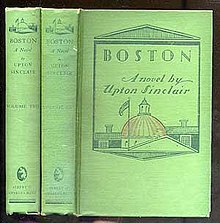Boston (novel)

First edition
|
|
| Author | Upton Sinclair |
|---|---|
| Country | United States |
| Language | English |
| Genre | Political fiction |
| Publisher | Albert & Charles Boni |
|
Publication date
|
1928 |
| Media type | Print (hardcover) |
| Pages | 755 (2 vols. numbered continuously) |
Boston is a novel by Upton Sinclair. It is a "documentary novel" that combines the facts of the case with journalistic depictions of actual participants and fictional characters and events. Sinclair indicted the American system of justice by setting his characters in the context of the prosecution and execution of Sacco and Vanzetti.
Sinclair worked from a passionate conviction that the executions of Sacco and Vanzetti constituted "the most shocking crime that has been committed in American history since the assassination of Abraham Lincoln" and a belief that "It will empoison our public life for a generation."
He interviewed Bartolomeo Vanzetti twice and conducted research following the execution of Sacco and Vanzetti in 1927. For his central character he used as his model a California acquaintance who recounted stories of her earlier life amid Boston's aristocracy. As part of his research he attended the funeral of a Boston industrialist. He recognized that some of his readers might find that disrespectful and offered this defense: "if you are a novelist you think about 'copy' and not about anybody's feelings, even your own." To verify dialogue, he even contacted a journalist to verify his fidelity in transcribing a jailhouse conversation. As a result, he avoided repeating the oft-quoted description of Sacco and Vanzetti, falsely attributed to Vanzetti, as "a good shoemaker and a poor fish peddler." In hundreds of letters he sought to acquire and verify details, such as the timing and physical setting of prison visits. He asked other correspondents to review parts of the manuscript for errors.
Another bit of his research has attracted periodic interest and political criticism. He interviewed Fred Moore, who served as defense attorney for the murder trial. Moore offered his opinion that Sacco was probably guilty of the payroll robbery, while Vanzetti might have known of plans for the robbery but not participated. Opponents of Sinclair's politics contend that his failure to adapt Moore's judgment in the novel constitutes a betrayal of his documentary claims. Sinclair, on the other hand, did not consider Moore's estimation determinative and Moore never claimed that either defendant had ever confessed his guilt to him. Much like the principal characters in the novel, Sinclair claimed no certain knowledge, only his instinct: "I did not know and could only guess." Later research has documented that Moore told Sinclair that the two were guilty and that he had contrived their alibis. Following the novel's publication, Sinclair wrote in a private letter that this had presented him with "the most difficult ethical problem of my life", but he had not altered the presentation he had planned for his novel.
In sum,he wrote: "Some of the things I told displeased the fanatical believers; but having portrayed the aristocrats as they were, I had to do the same thing for the anarchists." He expanded on the situation in a letter:
...
Wikipedia
